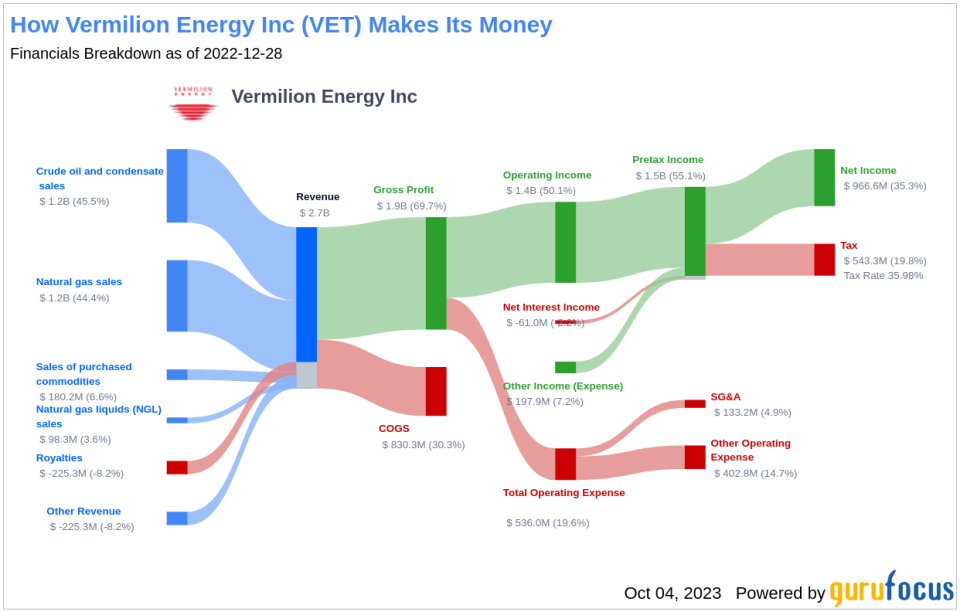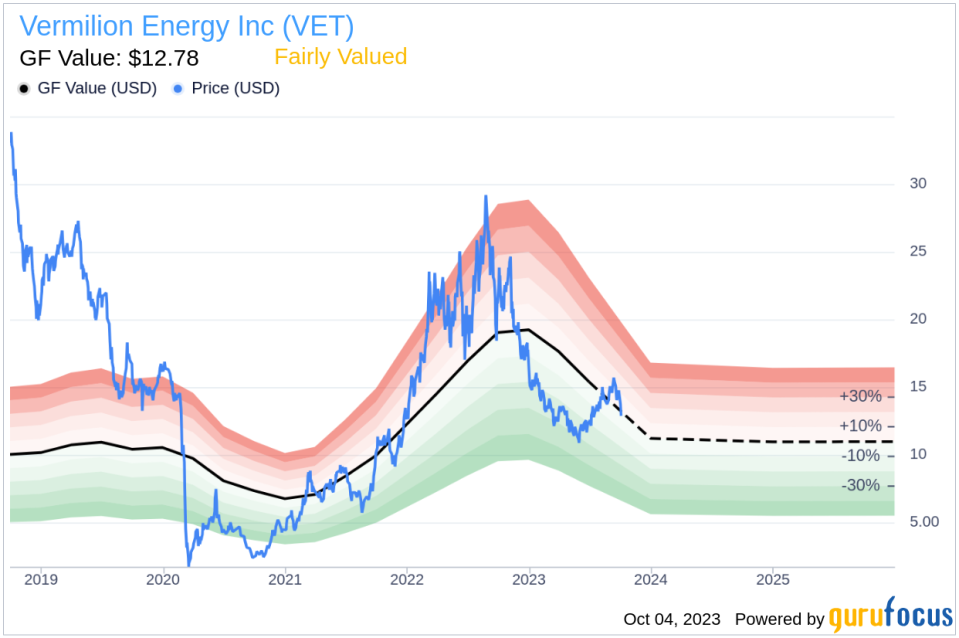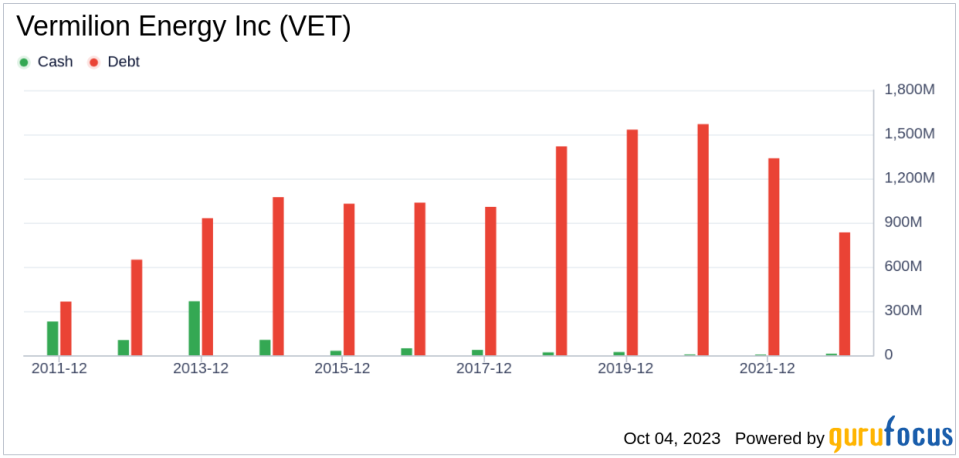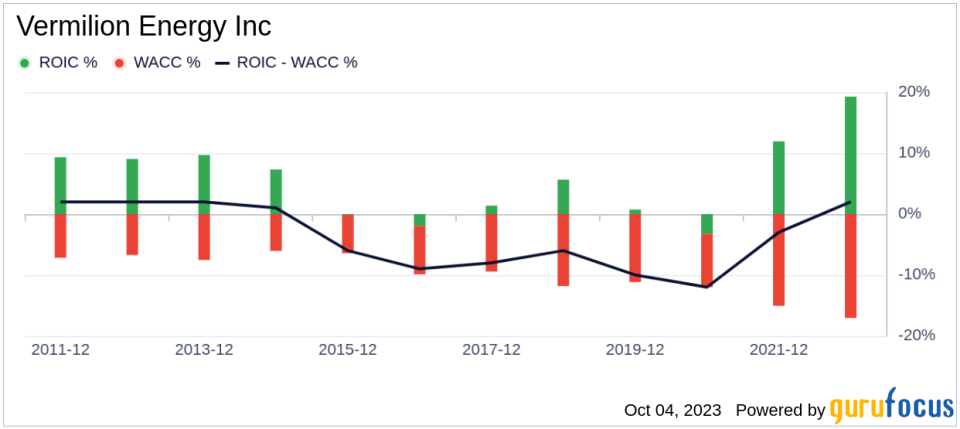Unveiling Vermilion Energy (VET)'s Value: Is It Really Priced Right? A Comprehensive Guide
Vermilion Energy Inc (NYSE:VET) experienced a 6.33% loss in its daily stock price, with a 3.23% gain over the last three months. The company's Earnings Per Share (EPS) (EPS) stands at 5.18. The question that arises for potential investors is whether the stock is fairly valued. This article provides a comprehensive valuation analysis of Vermilion Energy to answer this question. We encourage you to read on for an in-depth understanding of the company's value.
Company Introduction
Vermilion Energy Inc is an international oil and gas-producing company. It focuses on full-cycle exploration and production programs that include the acquisition, exploration, development, and optimization of producing properties. Its operations span across North America, Europe, and Australia, with the majority of its revenue derived from Canada. The company's stock price is currently $12.87, and its GF Value, an estimation of fair value, is $12.78. This close comparison paves the way for a deeper exploration of the company's value.
Understanding the GF Value
The GF Value is a unique measure of a stock's intrinsic value, calculated based on historical multiples, a GuruFocus adjustment factor, and future business performance estimates. The GF Value Line on our summary page provides an overview of the fair value at which the stock should ideally trade. If the stock price is significantly above the GF Value Line, it indicates overvaluation, and the future return is likely to be poor. Conversely, if it is significantly below the GF Value Line, the future return will likely be higher.
Based on GuruFocus' valuation method, Vermilion Energy (NYSE:VET) is believed to be fairly valued. The stock's fair value is estimated considering historical multiples, an internal adjustment based on the company's past business growth, and analyst estimates of future business performance. As Vermilion Energy is fairly valued, the long-term return of its stock is likely to be close to the rate of its business growth.
Link: These companies may deliver higher future returns at reduced risk.
Financial Strength
Companies with poor financial strength offer investors a high risk of permanent capital loss. To avoid this, an investor must review a company's financial strength before deciding to purchase shares. Both the cash-to-debt ratio and interest coverage of a company are great ways to understand its financial strength. Vermilion Energy has a cash-to-debt ratio of 0.05, which ranks worse than 85.58% of 1026 companies in the Oil & Gas industry. The overall financial strength of Vermilion Energy is 6 out of 10, which indicates that the financial strength of Vermilion Energy is fair.
Profitability and Growth
Investing in profitable companies, especially those with consistent profitability over the long term, is less risky. A company with high profit margins is usually a safer investment than those with low profit margins. Vermilion Energy has been profitable 7 over the past 10 years. Over the past twelve months, the company had a revenue of $2.30 billion and Earnings Per Share (EPS) of $5.18. Its operating margin is 38.06%, which ranks better than 81.31% of 979 companies in the Oil & Gas industry. Overall, the profitability of Vermilion Energy is ranked 7 out of 10, which indicates fair profitability.
Growth is one of the most important factors in the valuation of a company. If a company's business is growing, it usually creates value for its shareholders, especially if the growth is profitable. Conversely, if a company's revenue and earnings are declining, the value of the company will decrease. Vermilion Energy's 3-year average revenue growth rate is better than 73.02% of 860 companies in the Oil & Gas industry. Vermilion Energy's 3-year average EBITDA growth rate is 40.9%, which ranks better than 78.21% of 826 companies in the Oil & Gas industry.
ROIC vs WACC
Another way to evaluate a company's profitability is to compare its return on invested capital (ROIC) to its weighted cost of capital (WACC). Return on invested capital (ROIC) measures how well a company generates cash flow relative to the capital it has invested in its business. The weighted average cost of capital (WACC) is the rate that a company is expected to pay on average to all its security holders to finance its assets. If the ROIC is higher than the WACC, it indicates that the company is creating value for shareholders. Over the past 12 months, Vermilion Energy's ROIC was 11.64, while its WACC came in at 12.69.
Conclusion
In conclusion, the stock of Vermilion Energy (NYSE:VET) is believed to be fairly valued. The company's financial condition is fair, and its profitability is fair. Its growth ranks better than 78.21% of 826 companies in the Oil & Gas industry. To learn more about Vermilion Energy stock, you can check out its 30-Year Financials here.
To find out the high-quality companies that may deliver above-average returns, please check out GuruFocus High Quality Low Capex Screener.
This article first appeared on GuruFocus.




